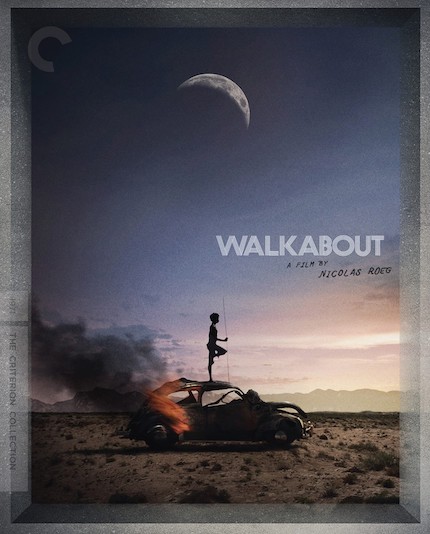WALKABOUT 4K Review: Poetry in Motion
Jenny Agutter, Luc Roeg, and David Gulpilil star in Nicolas Roeg's solo directorial debut, now in 4K from Criterion.

Grain, beautiful grain.
Walkabout
The film is now available on 4K, Blu-ray and DVD, via The Criterion Collection.
After a casual comparison of the Blu-ray and the 4K, the new digital master on the 4K UHD disc looks to have bolder, more vivid colors, deeper and more expansive sound, and a more expansive image, presented in the 1.85:1 aspect ratio with Dolby Vision HDR, versus the 1.78:1 aspect ratio with SDR on the Blu-ray.
As a celluloid fan, I was also pleased to see grain on the film, which has always made film feel more human to me, as that was what I grew up with in the 1970s. Shot in 1969, though not released until 1971, Walkabout was released with a 'GP' rating in the U.S., meaning: "All ages admitted -- parental guidance suggested," a rating that was changed to 'PG' the following year.
Cinematographer Nicolas Roeg read the novel by James Vance Marshall, first published in 1959, and became fascinated by its premise: two children "get lost in the Australian outback and are helped by an Indigenous Australian teenage boy on his walkabout." As the late Paul Ryan pointed out in his essay, first included with a Criterion edition in 2010, it took some years to attract interest from independent producers Max Raab and Si Livitnof, based on the script by British playwright Edward Bond.
Jenny Agutter, then 16, plays the older of two children whose father commits suicide on a trip into the Outback, leaving them to fend for themselves in an isolated, foreboding land. They are pretty much done for until a teenage Aboriginal boy about her age (David Gulpilil, making his screen debut) comes across them on his Walkabout on his journey to manhood.
The girl is also on her journey to womanhood, and so the stage is set for a long, beautiful journey that is not without its perils. The director's son, Luc Roeg (credited as Lucien John), plays the younger of the two children, a six-year-old boy, and together, the three ... just walk, and walk, and walk, and the two 'civilized' children discover what life is all about.
As director and photographer, Nicolas Roeg's solo directorial debut (after collaborating with writer/director Donald Cammell on Performance) is distinguished by his own unique voice, which he would continue to refine and expand upon in his subsequent films, notably in his next two, Don't Look Now (1973) and The Man Who Fell to Earth (1976). His camera eye encompasses spectacular landscapes and beautiful sunsets, filled with wild animals and wriggling insects, and the glories of a world that is made up of creatures who live and die before their body parts are ingested or otherwise used by other creatures.
As Jenny Agutter explains in a 20-minute interview from 2008 that is included, she had done some acting before, but it was this filming experience that confirmed her life's choice to pursue performance. She was sometimes accompanied by her mother, but otherwise she spent the entirety of filming with a crew that was respectful and nurturing, including Nicolas Roeg's own family.
Luc Roeg shares his memories of the experience in a 21-minute interview, recorded in 2010. For him, as the youngest, he was jealous of his two older brothers, who also came to Australia for the shoot, but could goof off all day. Still, he acknowledges that it was quite beneficial to have his entire family to support him, even if his father spent more time as director, rather than father, 0nce shooting started.
David Gulpilil's life story is told in Gulpilil--One Red Blood, a documentary from 2002, that covers what happened to him after the film. He stayed in touch with his people, returning home between film roles for longer and longer periods, as he raised many children with more than one partner. He remains an engaging storyteller.
I first heard about the film from a middle-school schoolmate in 1971 -- "that girl was nekkid!" -- though I didn't see it until I bought the Criterion DVD some 20 years ago, which featured both Nicolas Roeg and Jenny Agutter, edited together on an audio commentary (recorded in 1996), in which they talk extensively about their memories of the production.
It's quite a wonderful commentary, so I'm glad it's included here so I could listen to it again while I watched the spectacular sound and beautiful pictures on the 4K version. (Keep in mind the film's age and you'll have a better idea what to expect.)
The new edition features the interviews mentioned above, as well as the trailer released by 20th Century Fox that's even longer than the one embedded below, running 4:12 to include various quotes from critics of the day. The package also includes the marvelous essay by Paul Ryan in a printed booklet.
Somehow both timeless and yet distinctly a film that could only have been made in its time, Walkabout captures strange, captivating beauty and the memory of a world gone by, reassembled for our viewing pleasure.
Summing up: If you already own the Blu-ray and have a 4K-capable player and television, consider this upgrade a good investment.
The film, as well as most of the supplements, is now streaming on The Criterion Channel.
Walkabout
Director(s)
- Nicolas Roeg
Writer(s)
- Edward Bond
- Donald G. Payne
- Nicolas Roeg
Cast
- Jenny Agutter
- David Gulpilil
- Luc Roeg







